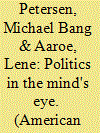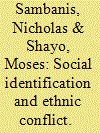|
|
|
Sort Order |
|
|
|
Items / Page
|
|
|
|
|
|
|
| Srl | Item |
| 1 |
ID:
121119


|
|
|
|
|
| Publication |
2013.
|
| Summary/Abstract |
The location of a government's capital can profoundly influence the nature and quality of political representation. Yet scholars know very little about what drives the siting of political capitals. In this article, we examine the location and relocation of political capitals in the United States, including the choice of Washington, DC, as the nation's capital and the location and relocation of capitals in the 48 contiguous American states. We argue that the location of capitals in the United States followed a systematic pattern in accord with the theory of representative government developed in the new nation, especially as articulated by Madison. Based on an empirical analysis of historical census and political boundaries data from 1790 to the present, we find that decision makers consistently tended to locate-and especially relocate-the seat of government as near as possible to the population centroid of the relevant political jurisdiction, consistent with the principle of equal representation of citizens. Our analysis contributes to the study of institutional design and change, especially in the area of American political development, as well as to a burgeoning literature on the effects of geographical factors on political outcomes.
|
|
|
|
|
|
|
|
|
|
|
|
|
|
|
|
| 2 |
ID:
121120


|
|
|
|
|
| Publication |
2013.
|
| Summary/Abstract |
Starting from the position that officer accountability is a core value of American constitutionalism, this article reassesses Marbury v. Madison in light of the indictable acts connected to the nondelivery of Marbury's commission. First, it reads Chief Justice Marshall's opinion against the background of personal and political hostility among the principals, including between Marbury and President Jefferson. Second, it identifies avenues of further redress open to Marbury before and after the Supreme Court's refusal of the mandamus order, and it considers why they were not pursued. Finally, having identified alternative procedural traditions on which Marshall could have drawn, and reviewed decisions by state and federal judges in analogous suits against officers, it concludes that Marbury's deepest contribution was to elevate the principle of jurisdiction over the imperative of remedy in constitutional decision making.
|
|
|
|
|
|
|
|
|
|
|
|
|
|
|
|
| 3 |
ID:
121125


|
|
|
|
|
| Publication |
2013.
|
| Summary/Abstract |
Theories of instrumental ethnic voting in new democracies propose that voters support co-ethnic politicians because they expect politicians to favor their co-ethnics once in office. But many goods that politicians deliver to voters are locally nonexcludable in rural areas, so the local presence of an ethnic group associated with a politician should affect a rural voter's assessment of how likely she is to benefit from that politician's election. Using geocoded polling-station-level election results alongside survey data from Ghana, we show that otherwise similar voters are less likely to vote for the party of their own ethnic group, and more likely to support a party associated with another group, when the local ethnic geography favors the other group. This result helps account for the imperfect correlation between ethnicity and vote choice in African democracies. More generally, this demonstrates how local community and geographic contexts can modify the information conveyed by ethnicity and influence voter behavior.
|
|
|
|
|
|
|
|
|
|
|
|
|
|
|
|
| 4 |
ID:
121124


|
|
|
|
|
| Publication |
2013.
|
| Summary/Abstract |
We offer the first large scale, multiple source analysis of the outcome of what may be the most extensive effort to selectively censor human expression ever implemented. To do this, we have devised a system to locate, download, and analyze the content of millions of social media posts originating from nearly 1,400 different social media services all over China before the Chinese government is able to find, evaluate, and censor (i.e., remove from the Internet) the subset they deem objectionable. Using modern computer-assisted text analytic methods that we adapt to and validate in the Chinese language, we compare the substantive content of posts censored to those not censored over time in each of 85 topic areas. Contrary to previous understandings, posts with negative, even vitriolic, criticism of the state, its leaders, and its policies are not more likely to be censored. Instead, we show that the censorship program is aimed at curtailing collective action by silencing comments that represent, reinforce, or spur social mobilization, regardless of content. Censorship is oriented toward attempting to forestall collective activities that are occurring now or may occur in the future-and, as such, seem to clearly expose government intent.
|
|
|
|
|
|
|
|
|
|
|
|
|
|
|
|
| 5 |
ID:
121122


|
|
|
|
|
| Publication |
2013.
|
| Summary/Abstract |
How do modern individuals form a sense of the vast societies in which they live? Social cognition has evolved to make sense of small, intimate social groups, but in complex mass societies, comparable vivid social cues are scarcer. Extant research on political attitudes and behavior has emphasized media and interpersonal networks as key sources of cues. Extending a classical argument, we provide evidence for the importance of an alternative and internal source: imagination. With a focus on social welfare, we collected survey data from two very different democracies, the United States and Denmark, and conducted several studies using explicit, implicit, and behavioral measures. By analyzing the effects of individual differences in imagination, we demonstrate that political cognition relies on vivid, mental simulations that engage evolved social and emotional decision-making mechanisms. It is in the mind's eye that vividness and engagement are added to people's sense of mass politics.
|
|
|
|
|
|
|
|
|
|
|
|
|
|
|
|
| 6 |
ID:
121121


|
|
|
|
|
| Publication |
2013.
|
| Summary/Abstract |
This article focuses on the link between the representation of lesbian, gay, bisexual, and transgender (LGBT) people in national legislatures and the existence of equality laws focused on sexual orientation. It addresses three interrelated questions: how many "out" LGBT legislators have served in national parliaments, what explains the cross-national variation in their legislative presence, and what is the relationship between the presence of gay legislators and the enactment of laws that treat gay and straight citizens equally? There is an established literature arguing that the representation of women and ethnic minorities "descriptively" in national legislatures improves the realization of their policy preferences and the position of the group within the society as a whole. This article draws on that literature and extends the analysis to LGBT communities. It finds that the presence of even a small number of openly gay legislators is associated significantly with the future passage of enhanced gay rights, even after including controls for social values, democracy, government ideology, and electoral system design. Once openly gay legislators are in office they have a transformative effect on the views and voting behavior of their straight colleagues. This "familiarity through presence" effect is echoed in studies of U.S. state legislatures and levels of social tolerance of homosexuality in the population at large.
|
|
|
|
|
|
|
|
|
|
|
|
|
|
|
|
| 7 |
ID:
121123


|
|
|
|
|
| Publication |
2013.
|
| Summary/Abstract |
When do ethnic cleavages increase the risk of conflict? Under what conditions is a strong common identity likely to emerge, thereby reducing that risk? How are patterns of social identification shaped by conflict? We draw on empirical results regarding the nature and determinants of group identification to develop a simple model that addresses these questions. The model highlights the possibility of vicious and virtuous cycles where conflict and identification patterns reinforce each other. It also shows how processes of ethnic identification amplify the importance of political institutions and traces the effects of national status and perceived differences across ethnic groups. Finally, we demonstrate how a small but sufficiently potent group of ethnic radicals can derail a peaceful equilibrium, leading to the polarization of the entire population. We reexamine several historical cases as well as empirical correlates of civil wars in light of these results.
|
|
|
|
|
|
|
|
|
|
|
|
|
|
|
|
| 8 |
ID:
121118


|
|
|
|
|
| Publication |
2013.
|
| Summary/Abstract |
The spread of cell phone technology across Africa has transforming effects on the economic and political sphere of the continent. In this paper, we investigate the impact of cell phone technology on violent collective action. We contend that the availability of cell phones as a communication technology allows political groups to overcome collective action problems more easily and improve in-group cooperation, and coordination. Utilizing novel, spatially disaggregated data on cell phone coverage and the location of organized violent events in Africa, we are able to show that the availability of cell phone coverage significantly and substantially increases the probability of violent conflict. Our findings hold across numerous different model specifications and robustness checks, including cross-sectional models, instrumental variable techniques, and panel data methods.
|
|
|
|
|
|
|
|
|
|
|
|
|
|
|
|
|
|
|
|
|